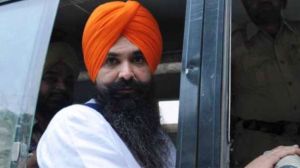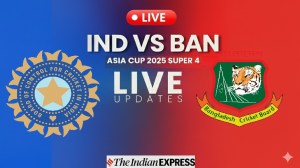Pak optimistic Clinton may break Kashmir stalemate
ISLAMABAD, MARCH 21: Pakistan on Tuesday said it was optimistic US President Bill Clinton would be able to open the door to a peaceful sol...

ISLAMABAD, MARCH 21: Pakistan on Tuesday said it was optimistic US President Bill Clinton would be able to open the door to a peaceful solution to the Kashmir problem between Islamabad and New Delhi.
"Clinton has almost unique qualities of persuasion. Here is a leader who has displayed a healing touch," in dealing with intricate international disputes, Foreign Minister Abdul Sattar told reporters. Citing the US peace-making role between Palestinians, Israelis and the Syrians, Sattar said Pakistan hoped he would find "some way" to break the Kashmir stalemate.
The US President, now on a state visit to India, has brought together the parties "even where the disputes were deep rooted in history," Sattar said. "He is a leader who has the capability of contributing toward a settlement of festering conflicts."
Sattar reiterated Pakistan’s demand for mediation by the US or any other country in the Kashmir row. No problem of any significance has been resolved between Pakistan and India through bilateral talks since the partition of the sub-continent in 1947, he said. Clinton, who is due to make a brief visit to Islamabad on March 25, has said the US could mediate only if both New Delhi and Islamabad agreed to such a role. India has firmly rejected any third-party involvement.
Sattar said since the Kashmir issue has been on the agenda of the United Nations since 1948 it was the obligation of the international community to help resolve the issue and bring justice to the people of Kashmir. It is not a "territorial dispute," Sattar said, adding it involved millions of Kashmiri people whose wishes, and the UN resolutions that promised them a referendum, could not be ignored. India terms the UN resolution as outdated.
"We hope Clinton’s negotiations in New Delhi and later in Pakistan may succeed in opening a new door to a peaceful settlement of the long-standing dispute to get the two countries out of a war trap," he said. Sattar said Pakistan understood US concern for early return to democracy after the October military coup.
"We hope also that the US will understand that Pakistan itself is committed to democracy. There is no question about our commitment." Sattar said the first step would be the holding of elections for local government councils by the end of the year. Military ruler General Pervez Musharraf will outline the steps in his speech on Pakistan’s National Day on Thursday to "manifest his commitment" to establishment of democracy, Sattar said.
He said Pakistan had shown "restraint and responsibility" in the nuclear domain and had not been the first to conduct nuclear tests in 1998. "Pakistan is prepared to join any non-discriminatory efforts for nuclear restraint, but it will not be singled out," he said.
Photos



- 01
- 02
- 03
- 04
- 05




























